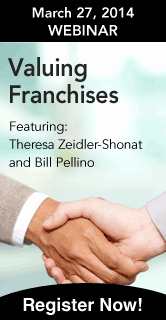
| March 19, 2014 | Issue #138-3 |
Advice for developing a lost profits/damages valuation practice A growing opportunity for valuation experts is in the area of lost profits and other commercial damages. In an exclusive interview, Nancy Fannon (Meyers, Harrison & Pia) and Jonathan Dunitz (Verrill Dana) talk about this area of practice from the perspectives of the valuation expert and the attorney. They are the editors of the most extensive book in this area, The Comprehensive Guide to Lost Profits and Other Commercial Damages,which has just been released in a newly expanded and enhanced edition. Unique area: What makes the valuation of lost profits and damages unique or different from other types of valuation assignments? “I think the most notable difference (compared to a non-litigation engagement) is the amount of evidence that you need to support a damage claim,” says Fannon. “This affects everything you do from the minute you take that first phone call to the end of the engagement. Also, the attorneys who handle these cases tend to be of a very high caliber, and financial experts really need to be conversant not only in the economics of damages, but also the law that guides the appropriate remedy associated with different actions.” What advice would they give a BV practitioner who wants to get into this area? “From an attorney’s perspective, communication skills are imperative if you want to be a sought after expert in this area,” says Dunitz. “Being able to communicate effectively through testimony or through the report is critical. It doesn’t matter to me whether you know lost profits analysis backwards and forwards. If you can’t explain it to a jury or a judge or in your report it’s not going to be very useful. Because of my background I will likely understand what you’re doing—but it is even more important that the jury, judge, and client understand your opinion and how you got there.” “From an expert’s perspective, you can’t get into this area until you understand the requirements,” adds Fannon. “You also have to understand how courts operate in terms of such things as the rules of evidence, civil procedure and document production. This is very critical in these types of cases. You also have to be prepared to testify. Also, you need to build your CV by, for example, writing, taking courses, and getting credentials. This increases your credibility to the court, which is critical to what we do.” Case law is crucial: Both Fannon and Dunitz point out that, because lost profits and damages are jurisdictional, keeping up with the case law is very important. Therefore, the new edition of their book is now in two volumes, with the second volume containing fully updated case law, split out by jurisdiction (including by state). You can read the full interview in the April issue of Business Valuation Update (subscription required). For information about the new edition of their book, The Comprehensive Guide to Lost Profits and Other Commercial Damages, click here. What it takes to be a ‘go-to expert’: Tips from the San Francisco expert witness conference The very dynamic James J. Mangraviti (SEAK Inc.) recently held a two-day seminar in San Francisco on “How to Be a Successful and Effective Expert Witness.” The workshop, organized by the Northern California chapter of the ASA, taught appraisers of all stripes, including business valuators, about the expert’s role in civil litigation and gave hands-on training on how to handle depositions or cross-examinations. It also instructed attendees on marketing and practice management. Before he threw participants into the fire with relentless role-playing, Mangraviti explored what an expert can do to stand out in the field. Here are some basic truths. Expert as teacher: The best experts see themselves as teachers. They approach questioning as an opportunity to help the jury understand complex and uncommon issues. A successful expert connects with jurors and exhibits sensitivity for what works and what doesn’t work in the courtroom. (Hint: Be careful about telling jokes!) Also, says Mangraviti, there is a razor-thin line between appearing confident—an attribute jurors and the retaining attorney appreciate—and coming across as arrogant—an attitude an expert wants to avoid. Mangraviti points out that business valuators face an extra challenge because they are asked to discuss topics that strike a lot of jury members as inherently “dry” and incomprehensible. The best way to overcome this handicap is by having a genuine interest in what you do and using language laypersons can understand. Commit to the profession: Mangraviti had a chance to interview Michael Kaplan (Kaplan Abraham Burkert & Co.), one of the country’s foremost experts in forensic accounting, about how Kaplan defines the term “go-to expert” and how he has achieved that distinction. According to Kaplan, a “go-to expert” is an expert who commits to learning all there is about his or her field of expertise in order to master the technical aspects; this means keeping up to date with industry developments and with the applicable professional standards. Don’t forget to adhere to them. A go-to expert understands the litigation environment and works well with retaining counsel. However, this does not mean becoming an advocate for the attorney’s side. Ultimately, the expert only represents his or her opinion, not a party in the case. Key advice: Kaplan has three bits of advice for budding experts or somewhat experienced experts who want to reach the next level in their careers:
Regarding that last point, don’t believe anything anyone tells you. Counsel may ask you to “just” work off certain assumptions, but these may have no basis in the record. The best practice is to base your opinion on the evidence, not on a party’s spin on the evidence. In fact, one of Mangraviti’s mantras during the workshop was that, even though experts are conditioned to be circumspect about the opposing counsel, the vast majority of their problems—80%— originate with the retaining lawyer. Experts are eager to please the hand that feeds them, but departing from the professional standards “can prove disastrous.” A reputation is an easy thing to lose. More on the attorney-expert relationship and the expert’s tools to manage it will appear in an upcoming BVWire. Tax Court: Discount rationale—not the amount—is the main concern Scrutiny on the part of the Tax Court in reviewing discounts for lack of marketability and control has placed renewed emphasis on the accuracy and defensibility of these adjustments to limited partnership interest appraisals. Therefore it was not surprising that, during the recent Partnership Profiles’ “Appraising Family Limited Partnerships” course in Dallas, many participants asked presenters Bruce Johnson and Jim Park (Munroe, Park & Johnson) about the appropriate discount when valuing an FLP. “The primary objection of the Tax Court has been how you support the discount and the rationale behind it. It is not a question of whether the discount is appropriate, it’s just how it’s determined,” Johnson says. “The ASA recognizes that as time goes along, concepts and theories change. As we get more and more information we continue to challenge or agree with new concepts and apply them in a better way,” he added. Indeed, Johnson and Eric Nath (Eric Nath & Associates LLC) discuss their perspectives on valuation of private minority interests in the upcoming ASA webinar Private Minority Interests Are NOT Bought or Sold Based on Discounts! on Tuesday, March 25, 2014, from 2:00 p.m. to 4:00 p.m. ET. IFRS 2014 ‘Red Book’ now available The International Accounting Standards Board and the IFRS Foundation just released the 2014 International Financial Reporting Standards—also known as the “Red Book.” The new edition contains all official pronouncements issued as of Jan. 1, 2014, including all pronouncements with an effective date after Jan. 1, 2014 (but not the standards that they will replace). The Red Book is available through the IASB's Web Shop. IFRS and IVSC coordinate on fair value The IFRS Foundation and the International Valuation Standards Council (IVSC) have announced a joint statement of protocols. The goal is the effective cooperation of the two organizations in this important area, with each organization continuing to assume sole responsibility for its standards. Shared interest: The IVSC and the IFRS Foundation have a shared interest in the consistent measurement of fair value for financial reporting. Certain standards issued by the IFRS through the International Accounting Standards Board (IASB) use fair value as a measurement basis. The IASB has also published IFRS 13 Fair Value Measurement, which sets out the principles for measuring fair value when it must be used in other financial reporting standards. The IVSC has standards and guidance on fair value and other valuation measurements and facilitates collaboration and cooperation among its member organizations to help ensure consistent application. Fair Value Symposium continues BVR’s Online Symposium on Fair Value Measurement continues on April 1 with Part 4 in the series, Proper Use of the Multi-Period Excess Earning Method, featuring Anthony Aaron (Ernst & Young). The multi-period excess earnings method is a powerful valuation tool. With great power, however, comes great responsibility. Aaron, who is an expert appraiser and Appraisal Foundation Board vice chair, will discuss the proper use and implementation of this valuation technique. People: Scott Cacurak has been appointed to national director of BDO's transaction advisory services in the Los Angeles office … Kevin Goldstein has joined Rothstein Kass as a director in the Business Advisory Services practice in its New York City office … Adams, Brown, Beran & Ball of Kansas announced that David Herl, CPA, CFP; Amber Littler, CPA, CGMA; and Brian DeWitt, CPA, have been promoted to principals of the firm … Former tax attorney in the Office of Chief Counsel of the Internal Revenue Service David Kirk has joined Ernst & Young LLP’s Washington, D.C., office as an executive director in the personal financial services practice … KPMG's Columbus, Ohio, office has named Matt Kramer managing partner … Rick Mills has been named chief operating officer of CBIZ Financial Services in Kansas City, Mo., and succeeds Chris Spurio, who was recently appointed president of CBIZ Financial Services … Mark O. Sikes, principal of the Deal Sikes & Associates valuation and counseling firm, has been appointed to the Houston Planning Commission … Pamela Wickes, director of forensic accounting at Teal, Becker & Chiaramonte of Albany, N.Y., has been named to the Business Review’s 40 Under Forty Class of 2014, honoring professionals under 40 years of age who are making a difference in their businesses and communities. Firms: The Commerce and Industry Association of New Jersey recently honored CohnReznick LLP for its “Impressive Good Works” … Denver-based EKS&H LLLP has acquired Infolink Consulting, a technology company that implements valuable information delivery and business analytics solutions. Valuing ASCs and franchises highlight new CPE events Two interesting valuation areas are the focus of upcoming webinars: Valuing Ambulatory Surgery Centers (March 25), featuring Todd Sorensen and Kevin McDonough (both VMG Health). Join Sorensen and McDonough for a look at how major ongoing healthcare consolidation trends are creating opportunity and peril for appraisers valuing ambulatory surgery centers. From considerations of Stark and AKS to fraud and compliance issues, this program, Part 3 of BVR’s Online Symposium on Healthcare Valuation, will cover what every appraiser needs to know. Valuing Franchises (March 27), featuring Theresa Zeidler-Shonat and Bill Pellino (both Smith & Gesteland). As of 2010, the U.S. Census Bureau estimated that 10% of businesses in the United States were either franchisee or franchiser-owned. Learn how the breadth and variety of franchise agreements affect business operations, performance, and ultimately value and how to account for these factors in the appraisal process. Copyright © 2014 by Business Valuation Resources, LLC |
Share This!
|


